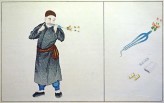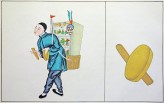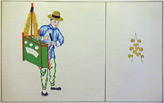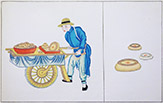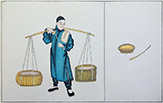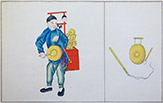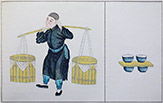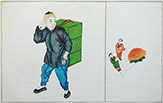This peddler calls –
“K’ou ch’in erh hai, mai k’ou erh ti”, “Jew’s harps have arrived, come and buy!”
These men sell Jew’s harps but their real business is selling dice sets composed of six dice – “shai tau”; a card game having thirty two cards – “ku p’ai”; and a card game having one hundred and twenty cards – “chih p’ai”. These games are much enjoyed by the people at New Year’s season but the selling of them is prohibited in order to discourage gambling.
The peddler carries a few Jew’s harps wrapped in a cloth but has the pockets of his long coats full of dice and card sets. The police know this but pay no attention as long as they do not actually see the sale of the prohibited articles. For this reason the purchaser calls the peddler inside his front gate, closes the folding doors and commences to bargain for the dice or cards.
The dice or “ku tzu”, commonly called “shai tzu”, are the same as used by foreigners. They have been known in China since before the T’ang Dynasty or for close to a thousand years. They come in sets of six.
There are two kinds of cards. The “ku p’ai” and “chih p’ai”. The “ku p’ai” come in sets of thirty-two and the sets are made of bamboo, wood or ivory depending on the price. The “cards” are about an inch wide and two inches long. There are sixteen sets which have from one to twelve dots on them. In other words there is a pair of each from ones to twelves and form extra pairs – two fives and two sevens. The game is much like the foreign game of dominoes and like dice is supposed to be about a thousand years old. One to four persons may play with the “ku p’ai”.
The “chih p’ai” are made of paper and each set has one hundred and twenty eight cards. Of these more than half have printed on them the picture of one of the famous characters from the “Shui Hu” or the book which Pearl Buck has translated and called “All Men Are Brothers”. In this book are one hundred and eight famous outlaws who took their names from one hundred and eight stars in the heavens. The other cards have dots, flowers or other designs on them. It takes four persons to play with “chih p’ai”. The game is said to be only some four hundred years old.


